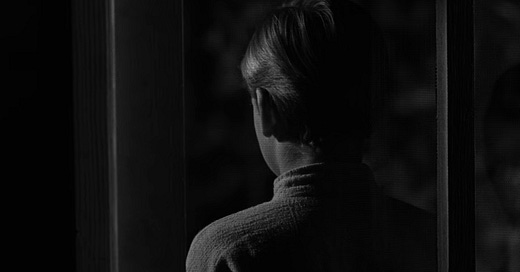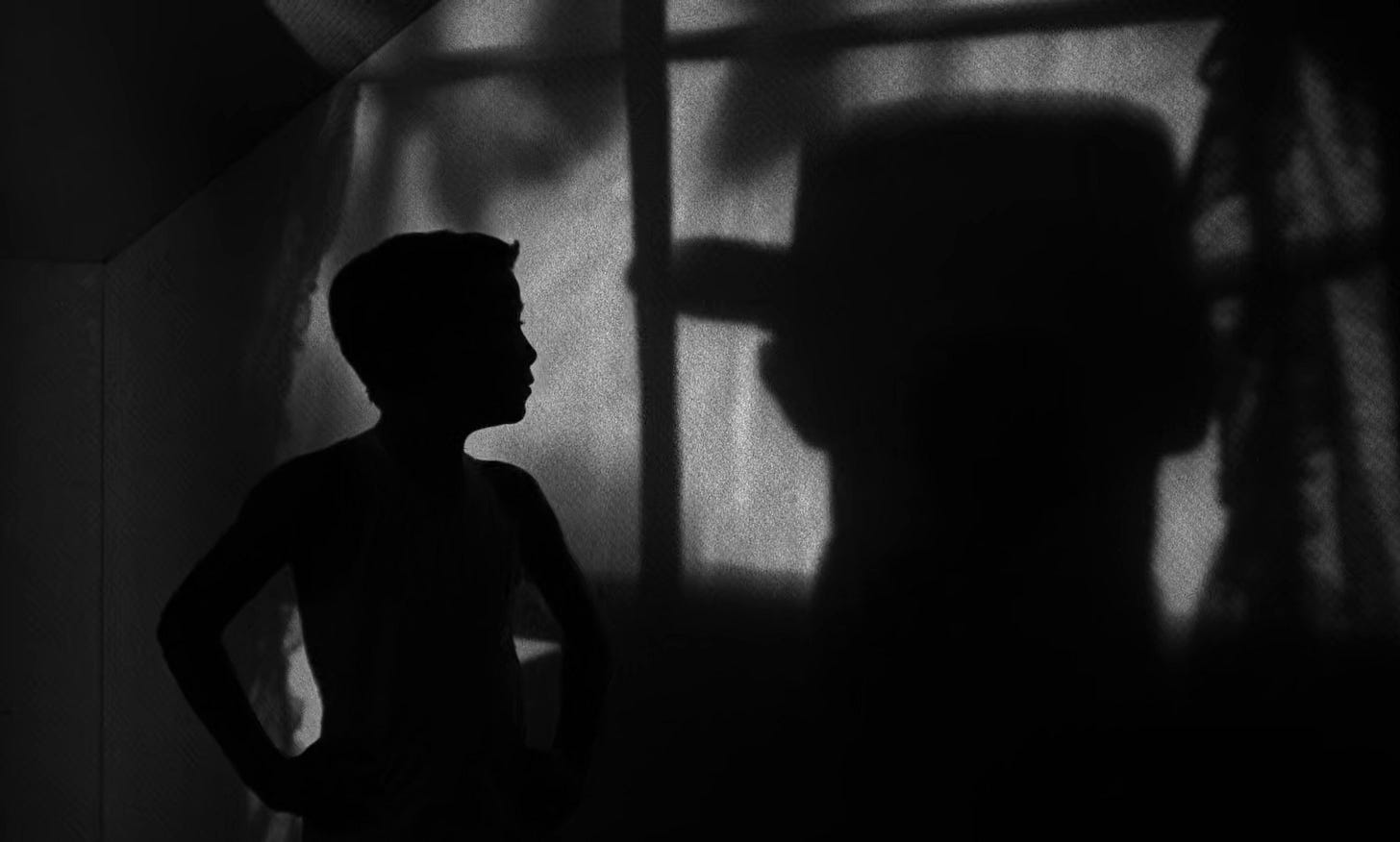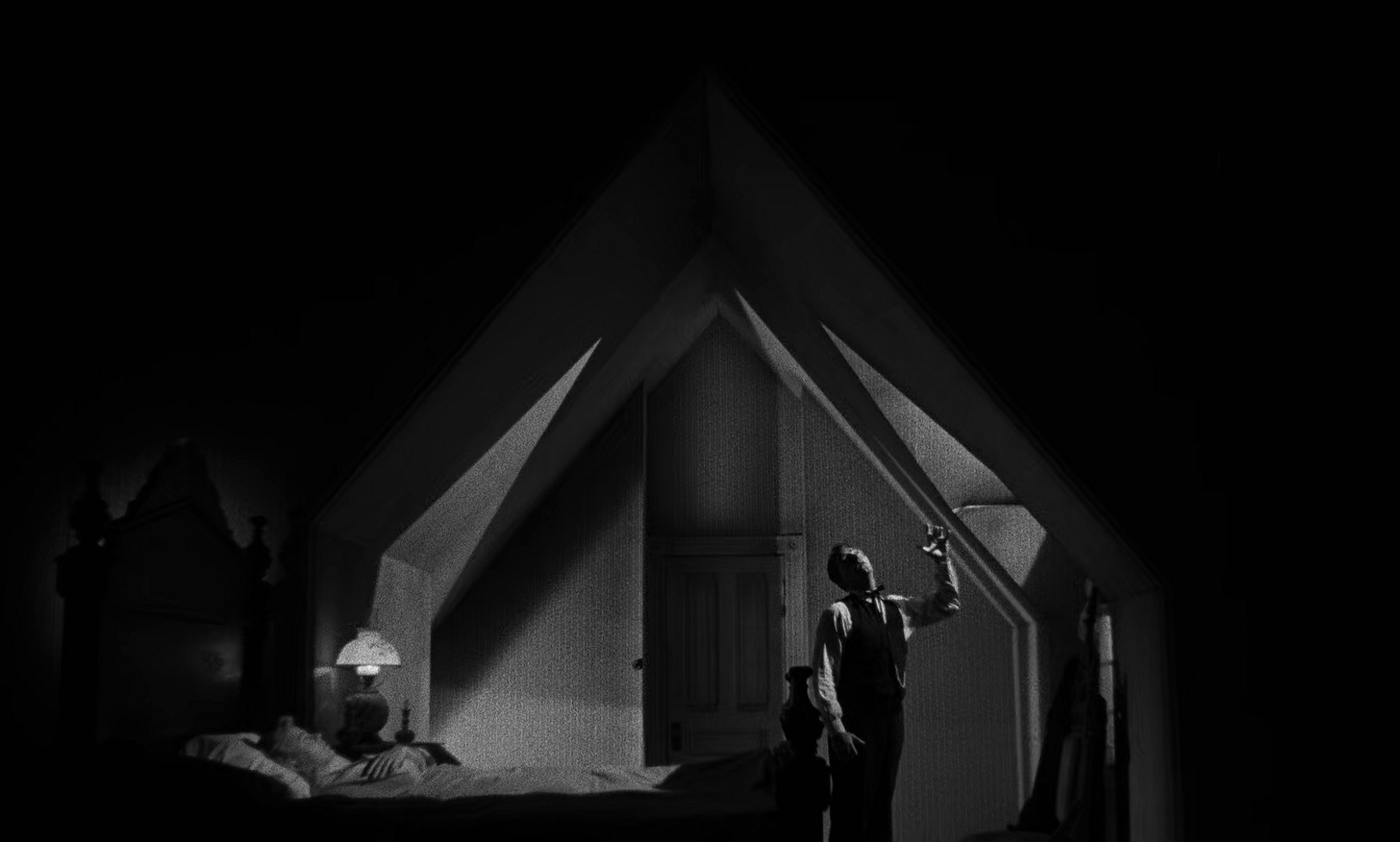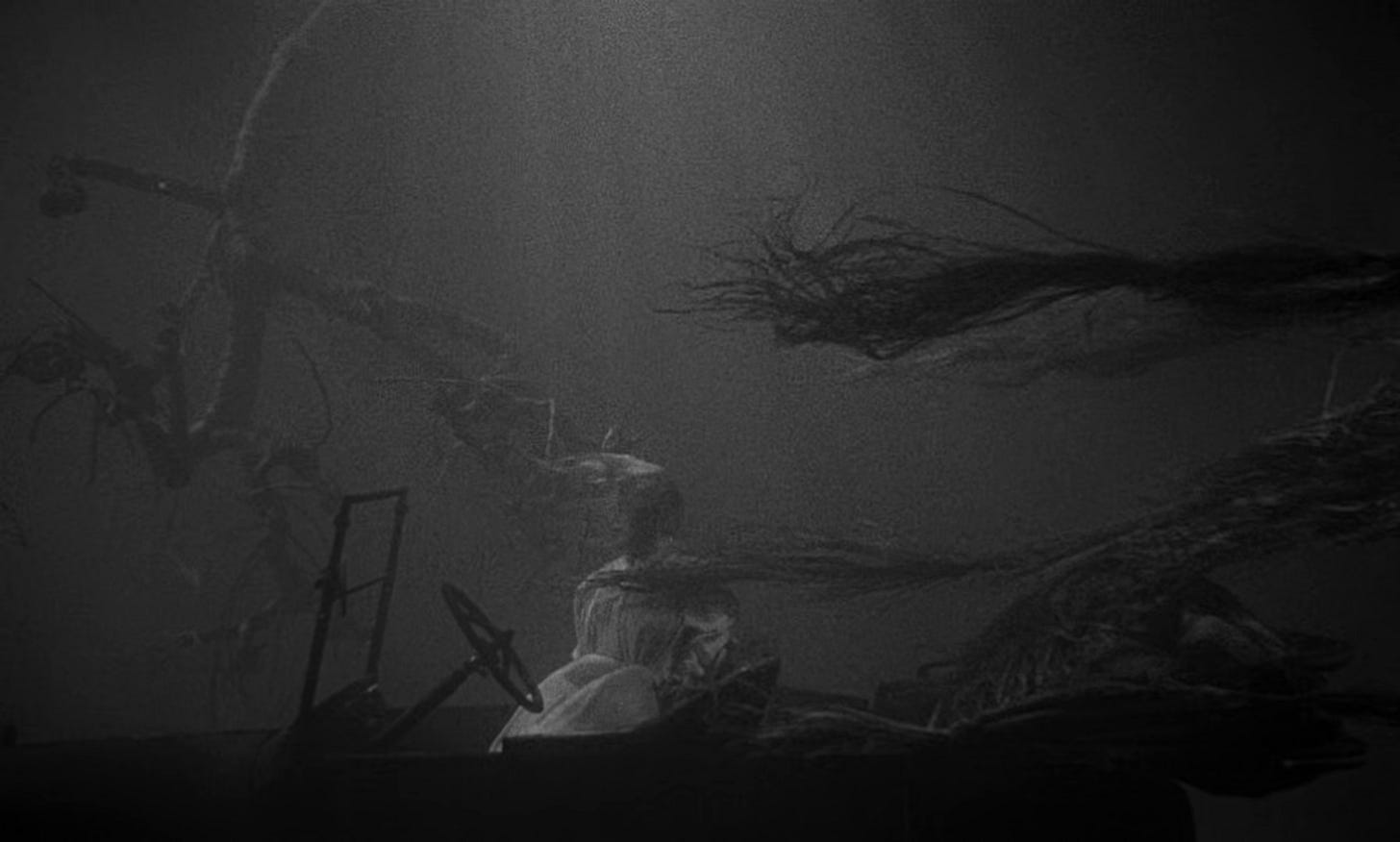The Nights and Days of the Serial Killer and the Adult Supremacists
Critical discussions on the 1955 Noir film "The Night of The Hunter"
SPOILER WARNING!
Charles Laughton, an actor from the United Kingdom, through the only feature film he made as a writer/director, “The Night of The Hunter,” brought to light discussions that remain pertinent even to this day. One such debate is on adult supremacy, a concept that gained traction about a century ago in tandem with the youth liberation movement and has been the subject of analysis and debate within the academic space. Stinney Distro, in her book, “No! Against Adult Supremacy,” says, “Every hierarchy, every abuse, every act of domination that seeks to justify or excuse itself appeals through analogy to the rule of adults over children. We are all indoctrinated from birth in ways of “because I said so.” The flags of supposed experience, benevolence, and familial obligation are the first of many paraded through our lives to celebrate the suppression of our agency, the dismissal of our desires, the reduction of our personhood.” Adult supremacy can, therefore, be simply defined as the belief that children are an inferior class in society and must comply with the expectations and environments adults around their lives have forced on them. This belief is deeply ingrained into society as we know it and leaves us with children unable to act on their newly gained autonomy as they grow older.
Stinney Distro offers insight into the nature of violence and how adult supremacy could play into enabling or even increasing violence. It is through the lens of religious psychosis, perpetuated by the antagonist, Harry Powell, that The Night of The Hunter sheds light on this school of thought.
Harry Powell is a preacher and a custodian of the good Lord’s word, well, not really. He’s a serial killer who believes his calling from the Lord is to kill widowed women. After being arrested for the theft of a car and sent to 30 days imprisonment, he meets a curious young man, his cellmate, Ben Harper. Ben, who is in prison waiting for the execution of his death by hanging punishment for the murder of two people, stole money with the intention of feeding hungry children but, due to a lack of time, left the stolen cash in the hands of his two children, John and Pearl. On further inspection of Ben Harper’s intentions, we see that this film seeks to make us reconsider our position on what children are capable of right from the beginning. The opening establishing image is of a group of children playing in a yard that find a dead body, presumably one Harry left behind, who rally other children to assess the situation. Then we’re led to Ben Harper placing stolen cash into the hands of John and Pearl. Right from the onset, we see children placed in situations you’d expect adults to be placed in, and you’re left to wonder what they’re going to do.
Harry thanks God for gifting him money and a soon-to-be widow and, once released, goes on a journey that leads us to the rural community where the Harper’s reside. Presenting as a preacher, Harry quickly gains favor amongst members of the community, particularly the eager Icey Spoon, who has been pushing Willa Harper, the wife of the now-dead Ben Harper, to get married to another man. We are introduced to the religious fundamentalism of the people of this rural town. Icey believes that a woman can’t be independent of a man in raising children because it is not as God ordained it.
“There are certain plain facts of life that add up like two plus two is four, and one of them is this: no woman is able to raise growing youngsters alone; the Lord meant that job for two… ain’t a question of wanting or not wanting. You’re no spring chicken. You’re a grown woman with two little yougin’s. It’s a man you need in the house, Willa Harper.”
Willa Harper, in protest, says that she doesn’t think she needs a husband, but her stance softens when Harry rides into town with all the charisma you’d expect of the antagonist of a Noir film. Faced with initial skepticism, Harry tells a charming story about the tattoos on his hands. On his left is the word, capitalized and in bold, “HATE,” and on his right is “LOVE.” He talks of the evil of the left hand stretching across generations because Cain used it to strike his brother Abel to death and the right hand’s overwhelming victory over it. This story is enough to convince Icey of good intentions, who, in turn, persuades Willa to take him into her house.
Naturally, John is skeptical of Harry’s intentions. In a scene at a picnic, where Willa and Icey talk about Harry, Icey starts the conversation by sending John and Pearl away from where they’re sat against their will. Willa then mentions John’s skepticism of Harry to Icey, who immediately dismisses John’s concerns, saying, “What he needs is a dose of salts.” Later on, Icey says to John and Pearl, “Come along here and get some fudge.” John replies, saying, “I don’t want no fudge,” and Icey reprimands him, saying, “You do what you’re told!” Moments of inconsideration for John’s feelings and emotions are scattered throughout the film.
In stark contrast to this treatment by Icey, Harry, who I must remind you is our villain, acknowledges the autonomy of the children as it best suits his interests to do so. He knows the money is in their hands and because of this, they have some semblance of power over him. He, however, uses Willa’s religious fanaticism to coerce her into doubting the authenticity of her children’s words over his, and so Willa falls into the trap of adult supremacy. She, therefore, refuses to believe that Harry has been asking John and Pearl about where the money is until one night when she comes back late from Icey’s ice cream shop and overhears Harry asking Pearl to tell him a secret, that being where the money is. Harry gets violent with Pearl, threatening to tear her arm off and calling her a wench, just as Willa walks into the home.
In a conversation after this incident, Willa confronts the reality of the situation, but due to her now deep indoctrination into her religious beliefs, is determined to absolve Harry of ill-doing, saying that it doesn’t matter what brought them together because he is here to take her closer to the way, the truth, and the life. Harry kills Willa in that conversation, straps her to her car, and drowns in the river. Her religious psychosis led to adult supremacism that prevented her from listening to the truth about Harry from her son and eventually cost her her life.
Two characters who play important roles in enabling John’s, and eventually, Pearl’s, autonomy are Uncle Birdie and a character we meet in earnest towards the end, Rachel Cooper. I say “in earnest” because the film starts with an overlay of Rachel Cooper’s sermon to the children in her home about false prophets, which sets a precedent for the overriding theme of the film.
Uncle Birdie is a fisherman widower who is regularly visited by John throughout the film. He acts as a tool of empowerment for John in the story. From their first interaction in the film, Uncle Birdie treats John with the same respect that he would treat an adult. Their first interaction involves Uncle Birdie revealing his conversation with Harry, in which Harry says he knows John’s father. But one line of dialogue stands out in correlation to the theme of youth liberation, and it is:
“I’ll not hide it from you, boy. He knowed him in the Moundsville Penitentiary.”
This line of dialogue provides a salient distinction from the interaction of Icey and Willa with the children. Here, Uncle Birdie acknowledges John as a human being who deserves to be involved in “adult” conversations. He believes in John’s intelligence and reaffirms his confidence in John making informed decisions. When they go fishing later in the film, Uncle Birdie asks another critical question about the premise of this discussion: “You mind my cussin’ boy?” John says he doesn’t. Uncle Birdie replies by saying that he asked because John’s now stepfather is a preacher. Uncle Birdie then goes on to talk about how he’s never really liked preachers and tells John that if there’s any trouble, he should come to him.
“I don’t know what’s wrong up at your house, but always remember, cap… if you’re ever in trouble, holler and come a-runnin’, Uncle Birdie’s your friend.”
This type of affirmation is vital to deconstructing adult supremacy. Uncle Birdie does not disregard John’s concerns and creates space for his vulnerability while also opening up the opportunity for help and supervision if needed. It is this type of dialogue that enables children to not see their physical limitations as a hindrance but rather a stage of living they cannot outrun. Their limitations are not used against them but instead supplemented with adult supervision. Their minds, their emotions, and their autonomy are protected. Uncle Birdie’s non-religious beliefs act as a foundation for his youth liberation ideals.
Rachel Cooper starts out as a stern character, whipping John into taking a bath, but as we spend more time with her, we see her empathy for children of all ages. Following her son’s departure, she’s used her home as a safe haven for children who are lost or are orphaned. However, unlike her secondary character counterpart, her deconstruction of adult supremacy takes foundation in her religious beliefs. As mentioned in the film, she believes that children are a class to be treasured and treated with the utmost care. As if the audience needed any more affirmation, we see an owl looking down at a defenseless bunny and watching it closely; then, just as it strikes down to gather the kill, she says, “It’s a hard world for little things.” A strong proponent of youth liberation regards children as a class with autonomy that is owed protection by their parents or adult figures around them. Colby Tootoosis writes in “The Cunning of the Adult Supremacist,” “…children are gifts from the creator and that it is the responsibility of the parents and family, who were gifted a child from the Creator, to do everything in their ability to ensure the child was safe, taken care of and supported until the child reached maturity.”
The climax of the film emphasizes this belief. Our villain, Harry, follows them all the way down to Rachel Cooper’s home and tries to infiltrate it the same way he infiltrated John’s hometown, but Rachel takes a vital action that only Uncle Birdie has taken so far throughout the film, and that is to listen to John. Her disbelief in his antics gains strength after asking John what’s wrong. John tells her plainly that Harry is not his dad, and that is enough to make Rachel pick up her shotgun and send Harry running away. He comes back at night and attempts to scare them further, but Rachel remains headstrong until he is eventually arrested and sentenced to death by hanging. Rachel’s resistance to disregarding John’s words saves the lives of everyone in her home.
Later on, we see these children gifting Rachel Christmas presents, and the film ends with Rachel’s interrupted monologue that goes:
“My soul is humble when I see the way little ones accept their lot. Lord save little children. The wind blows, and the rains are cold. Yet, they abide… They abide, and they endure.”
“The Night of The Hunter” is a film about many things. The overriding theme is the manipulative power that religion possesses. However, the adverse effects of adult supremacy can be seen throughout the film and at the core of the oppression rife in modern-day society. It’s crucial that we treat children as the human beings they are in order to cure society of its dysfunction and mitigate avoidable violence.












